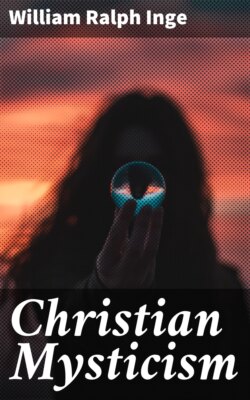Christian Mysticism

Реклама. ООО «ЛитРес», ИНН: 7719571260.
Оглавление
William Ralph Inge. Christian Mysticism
Christian Mysticism
Table of Contents
PREFACE
FOOTNOTES:
LECTURE
INDEX. LECTURE I
OLD POET. GENERAL CHARACTERISTICS OF MYSTICISM
FOOTNOTES:
LECTURE II
CLEMENT OF ALEXANDRIA
HENRY MORE
ADAM OF ST. VICTOR. THE MYSTICAL ELEMENT IN THE BIBLE
FOOTNOTES:
LECTURE III
LICHT UND FARBE
SCHILLER
CHRISTIAN PLATONISM AND SPECULATIVE MYSTICISM
I. IN THE EAST
FOOTNOTES:
LECTURE IV
HERACLITUS
COUSIN
GOETHE
JOSEPH BEAUMONT
SHELLEY. CHRISTIAN PLATONISM AND SPECULATIVE MYSTICISM
2. IN THE WEST
FOOTNOTES:
LECTURE V
MACARIUS
FABER
MANILIUS. PRACTICAL AND DEVOTIONAL MYSTICISM
FOOTNOTES:
LECTURE VI
FOOTNOTES:
LECTURE VII
MILTON
LOWELL
GOETHE. NATURE-MYSTICISM AND SYMBOLISM
FOOTNOTES:
LECTURE VIII
GOETHE
KEPLER
NOVALIS
FOOTNOTES:
APPENDICES
APPENDIX A
APPENDIX B
APPENDIX C
APPENDIX D
Отрывок из книги
William Ralph Inge
Published by Good Press, 2019
.....
It hardly falls within my task to attempt to determine what these visions really are. The subject is one upon which psychological and medical science may some day throw more light. But this much I must say, to make my own position clear: I regard these experiences as neither more nor less "supernatural" than other mental phenomena. Many of them are certainly pathological;[28] about others we may feel doubts; but some have every right to be considered as real irradiations of the soul from the light that "for ever shines," real notes of the harmony that "is in immortal souls." In illustration of this, we may appeal to three places in the Bible where revelations of the profoundest truths concerning the nature and counsels of God are recorded to have been made during ecstatic visions. Moses at Mount Horeb heard, during the vision of the burning bush, a proclamation of God as the "I am"—the Eternal who is exalted above time. Isaiah, in the words "Holy, Holy, Holy," perceived dimly the mystery of the Trinity. And St. Peter, in the vision of the sheet, learned that God is no respecter of persons or of nationalities. In such cases the highest intuitions or revelations, which the soul can in its best moments just receive, but cannot yet grasp or account for, make a language for themselves, as it were, and claim the sanction of external authority, until the mind is elevated so far as to feel the authority not less Divine, but no longer external. We may find fairly close analogies in other forms of that "Divine madness," which Plato says is "the source of the chiefest blessings granted to men"—such as the rapture of the poet, or (as Plato adds) of the lover.[29] And even the philosopher or man of science may be surprised into some such state by a sudden realisation of the sublimity of his subject. So at least Lacordaire believed when he wrote, "All at once, as if by chance, the hair stands up, the breath is caught, the skin contracts, and a cold sword pierces to the very soul. It is the sublime which has manifested itself![30]" Even in cases where there is evident hallucination, e.g. when the visionary sees an angel or devil sitting on his book, or feels an arrow thrust into his heart, there need be no insanity. In periods when it is commonly believed that such things may and do happen, the imagination, instead of being corrected by experience, is misled by it. Those who honestly expect to see miracles will generally see them, without detriment either to their truthfulness or sanity in other matters.
The mystic, then, is not, as such, a visionary; nor has he any interest in appealing to a faculty "above reason," if reason is used in its proper sense, as the logic of the whole personality. The desire to find for our highest intuitions an authority wholly external to reason and independent of it—a "purely supernatural" revelation—has, as Récéjac says, "been the cause of the longest and the most dangerous of the aberrations from which Mysticism has suffered." This kind of supernaturalism is destructive of unity in our ideas of God, the world, and ourselves; and it casts a slur on the faculties which are the appointed organs of communication between God and man. A revelation absolutely transcending reason is an absurdity: no such revelation could ever be made. In the striking phrase of Macarius, "the human mind is the throne of the Godhead." The supremacy of the reason is the favourite theme of the Cambridge Platonists, two of whom, Whichcote and Culverwel, are never tired of quoting the text, "The spirit of man is the candle of the Lord." "Sir, I oppose not rational to spiritual," writes Whichcote to Tuckney, "for spiritual is most rational." And again, "Reason is the Divine governor of man's life: it is the very voice of God.[31]" What we can and must transcend, if we would make any progress in Divine knowledge, is not reason, but that shallow rationalism which regards the data on which we can reason as a fixed quantity, known to all, and which bases itself on a formal logic, utterly unsuited to a spiritual view of things. Language can only furnish us with poor, misleading, and wholly inadequate images of spiritual facts; it supplies us with abstractions and metaphors, which do not really represent what we know or believe about God and human personality. St. Paul calls attention to this inadequacy by a series of formal contradictions: "I live, yet not I"; "dying, and behold we live"; "when I am weak, then I am strong," and so forth; and we find exactly the same expedient in Plotinus, who is very fond of thus showing his contempt for the logic of identity. When, therefore, Harnack says that "Mysticism is nothing else than rationalism applied to a sphere above reason," he would have done better to say that it is "reason applied to a sphere above rationalism.[32]"
.....